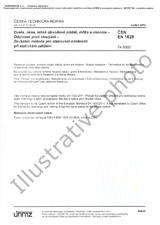We need your consent to use the individual data so that you can see information about your interests, among other things. Click "OK" to give your consent.
ČSN EN IEC 61970-302 (334910)
Energy management system application program interface (EMS-API) - Part 302: Common information model (CIM) dynamics
Translate name
STANDARD published on 1.11.2018
The information about the standard:
Designation standards: ČSN EN IEC 61970-302
Classification mark: 334910
Catalog number: 505530
Publication date standards: 1.11.2018
SKU: NS-903456
The number of pages: 482
Approximate weight : 1477 g (3.26 lbs)
Country: Czech technical standard
Category: Technical standards ČSN
The category - similar standards:
Annotation of standard text ČSN EN IEC 61970-302 (334910):
common information model (CIM) is an abstract model that represents all the major objects in an electric utility enterprise typically involved in utility operations. By providing a standard way of representing power system resources as object classes and attributes, along with their relationships, the CIM facilitates the integration of energy management system (EMS) applications developed independently by different vendors, between entire EMSs developed independently, or between an EMS and other systems concerned with different aspects of power system operations, such as generation or distribution management. SCADA is modelled to the extent necessary to support power system simulation and communication between control centres. The CIM facilitates integration by defining a common language (i.e. semantics) based on the CIM to enable these applications or systems to access public data and exchange information independent of how such information is represented internally.
Due to the size of the complete CIM, the object classes contained in the CIM are grouped into a number of logical packages, each of which represents a certain part of the overall power system being modelled. Collections of these packages are being developed as separate International Standards.
This particular document specifies a Dynamics package which contains extensions to the CIM to support the exchange of models between software applications that perform analysis of the steady-state stability (small-signal stability) or transient stability of a power system as defined by IEEE / CIGRE Definition and classification of power system stability IEEE/CIGRE joint task force on stability terms and definitions.
The model descriptions in this standard provide specifications for each type of dynamic model as well as the information that needs to be included in dynamic case exchanges between planning/study applications.
The scope of the CIM extensions specified in this standard includes:
- - standard models: a simplified approach to describing dynamic models, where models representing dynamic behaviour of elements of the power system are contained in predefined libraries of classes which are interconnected in a standard manner. Only the names of the selected elements of the models along with their attributes are needed to describe dynamic behaviour.
- - proprietary user-defined models: an approach providing users the ability to define the parameters of a dynamic behaviour model representing a vendor or user proprietary device where an explicit description of the model is not provided by the standard. The same libraries and standard interconnections are used for both proprietary user-defined models and standard models. The behavioural details of the model are not documented in the standard, only the model parameters
These changes apply to this standard:
Rozhraní aplikačního programu pro systémy řízení elektrické energie (EMS-API) - Část 302: CIM pro dynamiku (Norma k přímému použití jako ČSN).
Change published on 1.8.2024
Selected format:Show all technical information.
Preview of the standard ČSN EN IEC 61970-302 (334910)
We recommend:
Technical standards updating
Do you want to make sure you use only the valid technical standards?
We can offer you a solution which will provide you a monthly overview concerning the updating of standards which you use.
Would you like to know more? Look at this page.




 Cookies
Cookies
